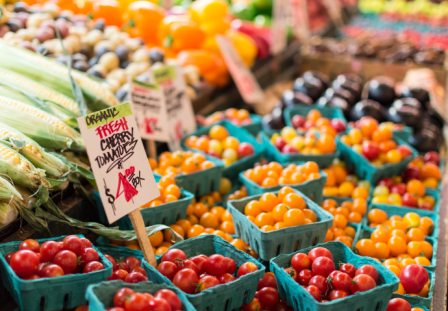
My wife Leslie and I are traveling around the U.S. in our motorhome. Recently, we spent a wonderful day at the Pike Place Market in Seattle, Wash. The market was enormous with indoor and outside displays of every imaginable food. There were numerous fruit and vegetable stalls selling their produce, some of which was in the form of cut fruit sold in cups and fresh squeezed fruit and vegetable juices. My first impression was “Wow, what a beautiful and healthy display of foods.” However, knowing what I know I also had the thought, “Does the public know of the dirty little secret about fresh produce that could make you sick or even kill you, and yes even from organically grown produce?”
The dirty secret — much of this produce can be contaminated.
So, should you wash your produce? The short answer is an absolute yes. Let’s face it nobody likes to get a mouthful of sand and grit when eating a salad, however there are many more reasons to wash your produce than this. Many of us may just carry on the traditions that our families did from the past, washing or not washing. For those who never wash, here is some information that may make you reconsider.
There are three reasons to wash your produce: contamination from soil; microbes; and pesticides. As I said, no one likes biting into a gritty salad, and the problems connected with microbe-contaminated produce have been well publicized. Pesticides are designed to be toxic and their effects on people are well understood, so it’s best to avoid them when you can.
Federal health officials estimate that nearly 48 million people are sickened by food contaminated with harmful germs each year, and some of the causes might surprise you. Although most people know animal products must be handled carefully to prevent illness, many don’t realize that produce can also be the culprit in outbreaks of foodborne illness. In recent years, the United States has had several large outbreaks of illness caused by contaminated fruits and vegetables including spinach, tomatoes and lettuce.
Fresh produce can become contaminated in many ways. During the growing phase, fruits and veggies may be contaminated by animals, harmful substances in the soil or water or poor hygiene among workers. After produce is harvested, it passes through many hands, increasing the contamination risk. Contamination can even occur after the produce has been purchased, during food preparation or through inadequate storage.
The FDA has some very good guidelines and recommendations when it comes to produce. Here is what they recommend:
Buying Tips
Purchase produce that is not bruised or damaged.
When selecting fresh-cut produce such as half a watermelon or bagged salad greens, choose items that are refrigerated or surrounded by ice.
Bag fresh fruits and vegetables separately from meat, poultry and seafood products.
Storage Tips
Store perishable fresh fruits and vegetables (like strawberries, lettuce, herbs and mushrooms) in a clean refrigerator at a temperature of 40° F or below.
Refrigerate all produce that is purchased pre-cut or peeled.
Preparation Tips
Begin with clean hands. Wash your hands for 20 seconds with warm water and soap before and after preparing fresh produce.
Cut away any damaged or bruised areas on fresh fruits and vegetables. Produce that looks rotten should be discarded. The bruised and damaged areas are where bacteria thrive.
All produce should be thoroughly washed before eating. Wash fruits and vegetables under running water just before eating, cutting or cooking. The more water the better here.
Many precut, bagged produce items like lettuce are pre-washed. If the package indicates that the contents have been pre-washed, you can use the produce without further washing.
Even if you plan to peel the produce before eating, it is still important to wash it first. For instance, if your melon has bacteria on the outside of it and you do not wash it, then cutting into the melon will introduce the germs into the flesh of the fruit.
Washing fruits and vegetables with soap or detergent or using commercial produce washes is not recommended. The effectiveness of detergents and commercial products have not been proven and can leave residue on the produce. Yuck, who wants detergent on their strawberries?
Scrub firm produce, such as melons and cucumbers, with a clean produce brush.
Drying produce with a clean cloth towel or paper towel may further reduce bacteria that may be present.
Also, keep in mind that packaged fruit and vegetable juices are required to be pasteurized to kill harmful bacteria. Farm stand and cider mills that sell fresh juice by the glass are not required to be pasteurized or have a warning label. Also, make sure that fresh cut fruit, such as melon, is stored under 40 degrees or packed on ice. The FDA has recommended the young, elderly or people with weakened immune systems avoid any unpasteurized juices or cut fruit that has not been stored properly.
One final piece of advice be diverse. Eat a wide variety of fruits and vegetables. This is not only nutritionally beneficial but may help limit exposure to any one type of pesticide residue.
This article was contributed by Dr. Stuart Offer.
 Related Articles & Free Subscription
Related Articles & Free Subscription
Growing Blueberries in Containers and the Garden






Comment here